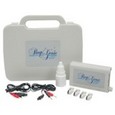Many of us think of our bedroom as our sanctuary. A place for privacy and relaxation and where, during sleep we can enter that place of dreaming that lets us resolve or just drift among those thoughts and images that we need to crowd out during the day due to all the practical things we need to give our attention to. We long for its quiet comfort during the day - especially if we are having trouble sleeping and are developing a sleep deficiency. The big mistake that many of us make - and which helps to ruin our sleep - is to invite the outside world into our sanctuary.
Besides our bedmates this is what our bedroom should look like if we want to be able to truly relax and find sleep.
The bedroom should be dark, (use black out curtains like in hotels or use an eye mask), and quiet, (use ear plugs if your room is not sound proof and if your partner’s breathing or snoring affects your sleep). It should be painted in gentle hues and kept cool, summer and winter.
Invest in a comfortable mattress and supportive pillow. Too many of us keep our mattresses far too long. The last few years have shown great improvements in the development of different materials for both mattresses and pillows, designs that conform to your body and mattresses that can be adjusted. Investing in a product that you spend 1/3 of your time on only makes practical sense.
Do not listen to the radio in bed, have a TV in your bedroom or catch up on work or pay bills in bed. Your laptop should never find its way into your bed. All these activities stimulate and not rest the mind. The bed should be associated only with sleeping. If you must only read in bed as soon as you find your eyes close naturally, put away your glasses shut off the light and sleep. The only physical activity allowed in bed is sex.
Turn its face away from you if the clock next to your bed faces you when you sleep and you can’t avoid looking at it when you are awakened at night – or trying to fall asleep – it can add to your anxiety. Turn it away from you so that you won’t be able to see the time. Not knowing how much longer you have until you have to get up helps you to re-establish sleep if you get up, to go to the bathroom, for example.
In the morning get up when the alarm goes off or when you wake up. If you wake up sooner than your alarm get up. Don’t lie in bed awake for more than 5 minutes.
You need to give as much thought to developing good sleep habits as you do to following a recipe to create the perfect dish. Your bedroom should be designed for its specific purpose - sleep - like your kitchen is designed for its purpose - creating good meals.
After all, sleeping and eating and exercise are the three most important things you need to do to maintain your overall good health.
Learn more about achieving a good night’s sleep at by reading about a 50 year technology that is now avialble for home use at: http://www.TheSleepGenie.com
Tova Greenberg launched The Sleep Genie three years ago in Canada after discovering that the 50 year old technology called CES, (used by similar devices device in the U) helped her husband overcome years of sleep problems created by his chronic pain. She is a mother of two grown children and is now devoting her life to educationg people about good sleep hygiene and alerting them to the powerful benefits of cranial electrotherapy stimulation, recommended by doctors to their patiens for more than 20 years.

Post new comment
Please Register or Login to post new comment.